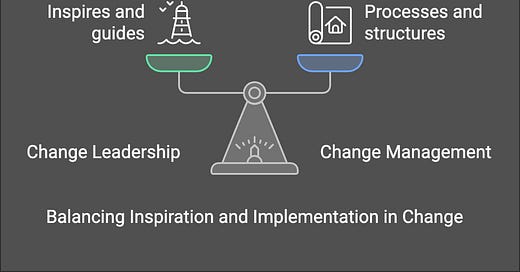The Great AI Leadership Crisis of 2025: Why Organizations Are Failing at Digital Transformation Despite Record Technology Spending
65% of AI Initiatives Will Fail in 2025: The Leadership Gap Is to Blame, Not the Technology!
The rapid advancement of artificial intelligence has created not just evolution, but a revolution in organizational transformation. Recent studies from Gartner show that while AI spending reached $200 billion in 2024, nearly 65% of organizations report their AI initiatives have fallen short of expectations. The stark reality? Technology investment alone isn't driving transformation – the leadership gap is.
The gap between AI leaders and laggards isn't about technology investment – it's about leadership approach. In 2025, this gap WILL become a chasm.
The Stakes Have Never Been Higher
A 2025 McKinsey report reveals a startling divide:
Organizations with strong AI-focused change leadership see 3.2x higher profit margins
Companies using traditional change management approaches face a 42% failure rate
Average cost of failed digital transformation: $15 million per project
The Traditional Change Management Trap
Historically, change management has focused on executing structured processes to implement new technologies or procedures. While this methodology served organizations well during the past decades of technological change, it's proving inadequate for the complexity of AI integration.
78% of organizations using traditional change management approaches for AI implementation are struggling with adoption beyond basic use cases. - MIT Sloan Study, 2025
The Evolution to Change Leadership: A Matter of Survival
Change leadership represents a holistic and visionary approach that goes beyond managing processes to inspiring transformation. The end of 2024 and early 2025 has already shown dramatic differences between organizations that embrace change leadership versus those stuck in traditional management approaches.
1. AI Requires Cultural Transformation
Organizations with strong change leadership are 2.7x more likely to report successful AI adoption across all departments, not just IT. Unlike previous technological advances, AI doesn't just change how we work – it fundamentally alters what work means.
2. The Pace of Change Demands Adaptability
Key findings from Stanford Digital Economy Lab:
Technical skills half-life: 18 months in AI-intensive fields
84% of "AI leaders" have implemented weekly technology adaptation sessions
Continuous learning is no longer optional – it's survival
3. Emotional Intelligence Becomes More Critical
The World Economic Forum's 2025 Future of Jobs Report shows demand for emotional intelligence and complex problem-solving skills has increased by 48% year-over-year.
Critical Action Steps for 2025 Success
You should be thinking about some of all of these as we kickoff January 2025!
1. Establish an AI Leadership Immersion Program
Timeline: 30 days to launch, 90 days for initial results
Launch mandatory weekly AI working sessions for C-suite
Implement AI-driven decision-making tools
Create accountability metrics
Success Metric: 100% of leadership team using AI tools daily by Q3 2025
2. Develop a Cross-Functional AI Innovation Task Force
Timeline: 45 days to establish
Create dedicated AI innovation teams (50/50 business/technical)
Allocate 20% of department budgets to AI experimentation
Establish monthly organization-wide AI innovation showcases
Success Metric: Three cross-functional AI initiatives launched per quarter
3. Implement an "AI First" Decision Framework
Timeline: 60 days to develop, 120 days for organization-wide adoption
Require AI solution consideration for all projects over $100,000
Establish ROI metrics including cultural impact
Create rapid testing protocols
Success Metric: 75% of new projects incorporating AI components by Q4 2025
4. Launch an AI Mindset Transformation Campaign
Timeline: 30 days to launch, 6 months for cultural impact
Develop an internal AI success story database
Create peer learning networks
Implement AI certification programs
Success Metric: 80% employee participation in AI initiatives by end of 2025
5. Build Continuous Learning Infrastructure
Timeline: 90 days to establish
Deploy personalized AI learning paths
Establish educational partnerships
Create internal AI mentorship programs
Success Metric: Monthly improvement in AI proficiency scores
Real-World Impact in 2025
Early adopters of AI change leadership are seeing:
34% higher employee retention
28% higher revenue growth
45% faster project completion rates
The Role of Leaders in 2025's AI Transformation
Success Metrics from Q1 2025:
Companies with AI-active senior leaders: 2.3x higher adoption rates
Organizations with "AI sandboxes": 67% higher innovation rates
Cross-functional AI teams: 3.1x more likely to report successful outcomes
The Path Forward: Act Now or Risk Obsolescence
The most dangerous approach in 2025 is maintaining the status quo. The gap between leaders and laggards is widening every quarter – which side of the divide will your organization be on?
The first quarter of 2025 will create a clear divide between organizations that are thriving in the AI era and those struggling to keep pace. The difference isn't in technology investment – it's in leadership approach.
The message is clear: The time for incremental change is over. Organizations must embrace comprehensive change leadership or risk becoming obsolete.
Jason Averbook is a global thought leader, keynote speaker, author, and future of work visionary on Human Resources, digital experience, and workforce technology; recently named one of the top 25 Human Capital consultants in the world. Currently a Senior Partner and Global HR Transformation Leader at Mercer, Jason has spent three decades advising executives, HR & People functions, and technology solution providers. He also drives Mercer’s global Generative AI strategy and services, spearheading innovative solutions across the HR technology landscape.
Jason has personally guided more than 1,000 HR transformations and deployments for some of the largest, most prestigious organizations in the world. He is the accomplished author of two books illustrating innovative approaches to HR, workforce experience, and digital transformation. From 2018 to 2023, Jason co-founded and served as CEO of Leapgen, a consultancy committed to helping organizations shape the digital workplace. In his expanded role with Mercer, Jason continues to challenge executive mindsets and advocate for digital-first cultures where business and people outcomes mutually flourish.





